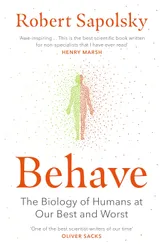Human behaviour is complex, and this book aims to capture and explain at least some of the complexity that goes into the decisions we make. Its focus, as the subtitle suggests, is on those behaviours that could be considered good or bad, and there is a particular emphasis on those occasions when the more rational parts of our brain override the more instinctive parts, in order to do the ‘right thing’.
The early part of the book takes as an example a hypothetical decision that someone makes to act in either a good or bad way, and attempts to explain how various factors contributed to the final result. This covers various time periods, from the state of the brain one second before, to the millennia leading up to the decision in terms of cultural and evolutionary factors. The rest of the book then expands on these cultural and evolutionary factors in a wide ranging discussion that takes in the concepts of nature versus nurture, free will, and the justice system. At various times, examples from the animal kingdom are brought in, including the author’s own work studying baboons. Unlike Sapiens, this book is much more willing to consider the influence of evolution on our behaviours, and takes a more scientific approach to the topic of why we behave the way we do.
One of the parts I found most interesting was the idea that the frontal cortex in human brains doesn’t finish developing until we are in our mid-twenties. This might explain some of the ways that adolescents behave, but it could also be evidence of an evolutionary adaptation that helps us to absorb the culture of our society by keeping parts of our brain flexible until adulthood.
This book is somewhat opinionated, but unlike A Hunter-Gatherer’s Guide to the 21st Century, this didn’t really bother me, perhaps because the author is clear about stating his political orientation and makes it clear when he’s expressing an opinion, and perhaps because I broadly agree with his stance on most of the topics discussed.
One of the best parts of this book is the appendix entitled ‘Neuroscience 101’ which gives an overview of how the brain works in terms of neurons, synapses, dendrites and action potentials. I read this before reading most of the book, and while the rest of the book refers back to the knowledge in this part, it’s well worth reading on its own for the clear and detailed explanations it provides.
This book is large, and quite dense with information. It took me quite a while to read it! But there is a lot of humour and topics are explained well. The author drops formal language at several points and uses slang expressions and sarcasm in a humorous way, which makes it quite fun to read. Ultimately, the conclusion is that human behaviour is complicated, and we’ll never know exactly why somebody acted a certain way, but the journey we go on, and the knowledge gained along the way, make this well worth reading.
